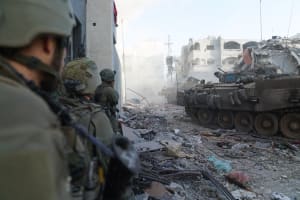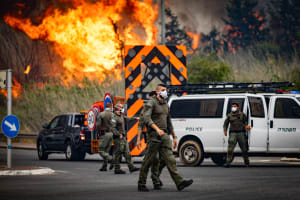Latest rocket barrage from Gaza highlights tensions within Israel’s leadership regarding withdrawal of troops
Security Cabinet member Sa’ar calls the drop in the intensity of fighting ‘a mistake’

The unusually large rocket barrage fired from the central Gaza Strip toward the Israeli town of Netivot on Tuesday again brought to the surface the deepening divide over the handling of the war in Israel’s political leadership.
The political leadership of Israel's War Cabinet and Security Cabinet, responsible for directing the war effort, is divided into two camps over the issue, irrespective of party lines.
Defense Minister Yoav Gallant (Likud party) and ministers Benny Gantz and Gadi Eisenkot (National Unity party) represent the side that appears ready to shift the war to a less intensive phase, or in the case of Gantz and Eisenkot, even to entertain a full stop to the fighting in return for a hostage deal.
On the other hand, Minister Gideon Sa’ar positioned himself on the side of War Cabinet members Prime Minister Benjamin Netanyahu (Likud) and Strategic Affairs Minister Ron Dermer by publicly calling the drawdown ‘a mistake.’
Following Tuesday’s rocket barrage of dozens of rockets, fired from the area from where the IDF’s 36th Division had just withdrawn the day before, Sa’ar called for a meeting of the security cabinet to discuss the issue.
“Greetings from reality. The goals have not yet been achieved. The war must not be stopped before the objectives are achieved. It’s wrong to lower the military pressure. It should be increased,” he commented on reports of the rocket attack on X.
“Decreasing the intensity of IDF activity in the Gaza Strip and reducing the size of the forces there in the current situation is wrong,” Sa’ar added.
In a nod to U.S. pressure on Israel to lower the war’s intensity, he also urged that decisions to continue should be made according to operational progress, not according to timetables.
Sa’ar’s comments on Tuesday followed similar points he made the evening before when criticizing Gallant for implying that the IDF’s ground operation in the southern Gaza Strip would soon come to a halt.
“I am opposed to leaving Khan Younis before we see progress in the issue of the hostages and the elimination of the leaders of Hamas. There is currently no [hostage deal] outline that anyone proposes to accept,” he told Israel's Channel 12 news. “We must complete the job.”
Earlier in the day, Gallant had announced: “The phase of intensive maneuvers has ended in the north of the Gaza Strip, in the south of the Gaza Strip, it will end soon… At the beginning of the fighting, we specified the stages and made it clear that the intensive maneuvering stage in the Gaza Strip would last for about 3 months.”
On Monday, IDF Chief of Staff Lt.-Gen. Herzi Halevi warned that the political echelon’s lack of strategic vision for the Gaza Strip after the war could endanger the army’s achievements, as troops are being withdrawn without a clear concept of what should happen afterward.
According to an Army Radio report, officials in Israel’s security establishment are already seeing worrying signs of Hamas attempting to reestablish its civilian institutions in areas in the northern Strip, where the IDF has already removed many of its troops.
“The main concern in the security establishment is the possibility that Hamas will succeed in restoring its military capabilities in the region as well,” according to the report.
An indication of these developments can also be seen in several concerning reports on Monday from across the northern Gaza Strip, as soldiers found 60 rockets ready for launch in Beit Lahia and killed nine terrorists in one engagement in Al-Shati refugee camp.
In addition, a barrage of about 10 rockets was fired from Beit Hanoun at Sderot yesterday, before today’s even larger salvo toward Netivot.
“Did the decision to switch to targeted brigade-level raids in the northern Gaza Strip come too soon, and would it have been better to leave an entire division for massive maneuvers in the area and not to reduce its forces?” Army Radio’s military correspondent asked.
“How is it possible that there still wasn’t one serious discussion in the cabinet on the issue of control over Gaza ‘the day after,’ when IDF forces withdrew from the north of the Strip and left such a vacuum there?”

The All Israel News Staff is a team of journalists in Israel.
You might also like to read this:
















